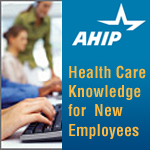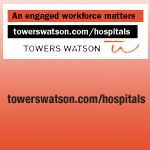ASHHRA eNews Pulse
ASHHRA
ASHHRA e-News Brief: November 2012Over the last several months I’ve taken the opportunity to introduce you to our board members and to some of the ASHHRA staff. You’ve read about their work with education, the annual conference, concierge, non-hospital members, and many other initiatives and programs underway in great part through the efforts of each and every one of our board members and staff, along with their committees. Among these great leaders are four others you should know about. These individuals sometimes quietly... wait... maybe quietly is not the word. These individuals sometimes work behind the scenes; they help ASHHRA accomplish its goals and meet the needs of our members. So here they are:
Bob Walters, corporate director, HR operations at Health First, Inc. in Melbourne, Fla., is our immediate past president. He is the wonderful supportive person that usually sits to my left and makes sure I don’t miss anything. Bob also led our Though Leader Forums and did a great job with both of them. Bob, thank you for being there and sharing your expertise and support with our board and our members.
Michael Robinson, chief executive officer and senior vice president of operations at Bon Secours in Mechanicsville, Va., is our CEO on the board. If you’ve ever met Michael you know that he is one of the busiest CEOs in the business. Yet, he was willing to share a year of his time and share his opinions on the business of health care. Thank you, Michael, for helping us stay in tune with the needs of our CEOs.
Joe Micucci, manager, health improvement strategies at Jefferson University Hospital in Philadelphia, Pa., is our treasurer and the man behind the camera. If you’ve ever attended an ASHHRA event, you might have noticed a professional photographer and JOE! Joe is our historian, although that is not his official title. If you have been attending ASHHRA conferences, it’s very likely that Joe captured your photo. When it comes to capturing the moment, he is the most enthusiastic person you will ever meet. Joe, every moment we spend with friends and family is so precious, thanks for capturing our ASHHRA friends and family and all those special moments over the years.
Not behind the camera, but behind the scenes is Shirley Armistead. Shirley is ASHHRA’s senior governance specialist, and she quietly and calmly helps us all move in the same direction together. Working closely with Stephanie Drake, executive director, Shirley makes sure we remember to "dot our Is and cross our Ts"—both literally and figuratively. Shirley has been with AHA 20 years, and seven have been with ASHHRA. Thank you, Shirley, for keeping us on the straight and narrow path all these years.
To borrow from Tom Flick, our keynote speaker at the annual conference, say thank you to your friends, family, and coworkers today. Send them a note that you are thinking of them and appreciate the help and support they give you. Send a text or an email or even make a phone call if that is easier for you. Let them know how much you count on them and how glad you are that they are in your life. Don’t wait for Thanksgiving. Leading People Through Change begins with building community. This is a great opportunity to reach out and say thanks!
Leading People Through Change,
Irma L. Pye, SPHR
ASHHRA 2012 President
Senior Vice President & CHRO
Valley Baptist Health System
Harlingen, Texas
Visit http://www.ashhra.org/conference/2013/schedule.shtml to view the full article online.
Visit http://www.ashhra.org/toolkits/f-m/health_reform.shtml#tools to view the full article online.
Visit http://www.ashhra.org/about/governance/thoughtleaderforum.shtml#tlf_2012_denver to view the full article online.
Visit http://www.ashhra.org/conference/2013/index.shtml to view the full article online.
Visit https://www.research.net/s/ASHHRAHealthCareWorkforcePlanningModel to view the full article online.
Medical schools around the country continued to see enrollment grow in 2012. But educators warn that efforts to produce more physicians will mean little without more federal funding for graduate medical education.
SOURCE: AMEDNEWS.COM
Visit http://www.ama-assn.org/amednews/2012/11/05/prsb1107.htm to view the full article online.
Long hours don't just make for unhappy nurses; they make for unhappy patients, according to a study published in Health Affairs.
SOURCE: FIERCE HEALTHCARE
Visit http://www.fiercehealthcare.com/story/long-nurse-shifts-lead-burnout-patient-dissatisfaction/2012-11-06 to view the full article online.
Executive compensation is a delicate subject no matter the industry, and for hospital and health system executives, their pay has been scrutinized more in the past several years as organizations continue to feel the strain of compressed finances.
SOURCE: BECKER’S HOSPITAL REVIEW
Visit http://www.beckershospitalreview.com/compensation-issues/are-hospital-executives-paid-too-much.html to view the full article online.
As hospitals engage physicians in more leadership and management models, it may behoove boards to identify specific obligations as they craft physician leadership compensation contracts, according to an article from INTEGRATED Healthcare Strategies.
SOURCE: BECKER’S HOSPITAL REVIEW
Visit http://www.beckershospitalreview.com/compensation-issues/5-principles-for-compliant-physician-leader-compensation-contracts.html to view the full article online.
This is a landmark week in the United Kingdom for employee engagement. The Engage for Success initiative has launched—the result of three years of intensive research, collaboration and networking on employee engagement across the UK.
SOURCE: TLNT
Visit http://www.tlnt.com/2012/11/13/engage-for-success-how-the-uk-is-tackling-employee-engagement/ to view the full article online.
What’s a second term for the Obama administration going to mean for HR pros? Here’s a sampling of what the experts are saying.
SOURCE: HR MORNING
Visit http://www.hrmorning.com/what-obamas-second-term-will-mean-for-hr/ to view the full article online.
The shortage of surgeons will become more acute in 2013 and beyond as the pool of board-certified generalists and specialists in fields such as orthopedic surgery and neurosurgery grows smaller. But there are ways to ensure you tap the available supply to meet your staffing demands.
Visit http://www.naylornetwork.com/ahh-nwl/pdf/Meeting_the_Challenges_of_Surgeon_Shortage_Final_11-5-12.pdf to view the full article online.
I've been a hospital administrator for nearly 30 years and have helped lead a variety of hospitals in urban, suburban, and rural settings. Whether or not our plan was to gain market share or to fill gaps due to retirements, physician recruitment has been part of every strategic plan.
SOURCE: BECKER’S HOSPITAL REVIEW
Visit http://www.beckershospitalreview.com/hospital-physician-relationships/10-steps-for-hospitals-to-follow-to-recruit-new-physicians.html to view the full article online.
The days of doctors owning their practices soon may be as rare as house calls and low-cost care. More independent doctors across the U.S. now work for hospitals.
SOURCE: WYOMINGNEWS.COM
Visit http://www.wyomingnews.com/articles/2012/10/21/news/01top_10-21-12.txt to view the full article online.
Each fall, medical students in their fourth and final year select a medical specialty and apply to residency programs. Residency, which lasts anywhere from three to eight years, is run by teaching hospitals. It's when newly minted MDs learn the hands-on, practical skills of doctoring—how to make diagnoses, perform surgeries, order and interpret tests, etc. They also know how to deal with patients and families, and work with other caregivers. Just like colleges and medical schools, residency programs vary in terms of reputation—which naturally affects the number and caliber of the medical students who apply to get in. But does training at a prestigious hospital mean residents will become good doctors? Maybe not.
SOURCE: THE ATLANTIC
Visit http://www.theatlantic.com/health/archive/2012/11/do-prestigious-residencies-mean-better-doctors/265038/# to view the full article online.
It’s eight am at Kingston General Hospital (KGH) and 100 first-year resident physicians are taking their seats at staff orientation. While many of the young physicians may be anticipating hearing from senior health-care leaders at KGH, the first person to take the podium is not a medical professional at all, at least not in the traditional sense. "Hello, my name is Anndale McTavish. I am the patient and I am the reason that you’re here," she says. McTavish is a former patient who underwent treatment for colon cancer at KGH in 2009. She is also the co-chair of KGH’s Patient and Family Advisory Council and one of the hospital’s nearly 50 Patient Experience Advisors. She and her fellow advisors are on a mission to ensure that each patient who enters KGH has a better experience than the last.
SOURCE: HOSPITALNEWS.COM
Visit http://www.hospitalnews.com/pioneering-the-patient-partnered-hospital/ to view the full article online.
What's it take to lead a hospital today when health care is changing in such a multitude of ways? Six CEOs from hospitals and health systems around the country say it's a balancing act. First you must acknowledge to everyone involved—board members, the executive team, clinicians, and nonclinical staff—that the business model is being turned on its head and will never be the same again. Then, you must assure them that however it all turns out, everything will somehow be OK.
SOURCE: HOSPITALS & HEALTH NETWORKS
Visit http://www.hhnmag.com/hhnmag/HHNDaily/HHNDailyDisplay.dhtml?id=9240006976 to view the full article online.
Trust in CEO credibility across industries has dropped 12 points to 38 percent, according to the 2012 Edelman Trust Barometer, which calls into question how hospital leaders are viewed by hospital C-suite members, employees, and patients. Anthony Cirillo, president of Fast Forward Consulting, urged CEOs to practice what they preach and reinvent themselves, just as they instruct employees to do, thus building peer-to-peer trust.
SOURCE: FIERCE HEALTHCARE
Visit http://www.fiercehealthcare.com/story/build-trust-top-down/2012-11-08 to view the full article online.
Empathy and compassion dwell at the core of the collective physician intention. We hold a noble commitment, and have taken a sober oath, to offer healing and caring to all who come to us with suffering. In the swirling eddies of our busyness, we may take shortcuts that do not demonstrate how deeply we care about our work and our patients.
SOURCE: HOSPITAL IMPACT
Visit http://www.hospitalimpact.org/index.php/2012/10/31/communicate_with_empathy_for_a_better_pa to view the full article online.
Health care leaders are inundated with pleas and demands from payers, the government, their boards, and even their patients to be more accountable to them in cost, quality, and patient safety. Frontline staffers are the focus of the day-to-day evaluation, but senior leaders are charged with developing strategies that will help the organization adapt to new roles. Senior leaders have no playbook from which to evaluate how well they and their most senior deputies are doing, but some innovative senior leaders are keeping it simple.
SOURCE: HEALTHLEADERS MEDIA
Visit http://www.healthleadersmedia.com/content/MAG-286326/Evaluating-and-Replacing-Leaders to view the full article online.









